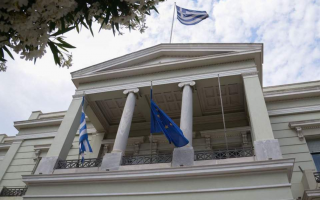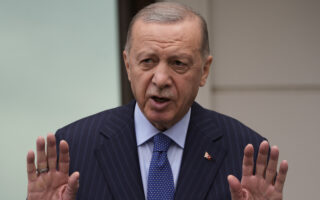‘Those who abuse asylum’ cannot be in Germany
Vice Chancellor Robert Habeck discusses the dynamic of Greek-German economic relations, migration and climate change with Kathimerini

Any person “who abuses our hospitality or the right to asylum can have no claim to invoke it,” Germany’s Vice Chancellor and Economy Minister Robert Habeck tells Kathimerini in an interview provided through written questions, referring to the recent knife attack in the western town of Solingen, where three people were fatally stabbed at a street festival. The minister also commented on the German government’s efforts to speed up deportations of failed asylum seekers to stem the rise of the far-right AfD.
Habeck, who is in Thessaloniki for the city’s annual international fair where Germany is the honored country, called on Turkey to “take into account its Alliance obligations within the framework of NATO but also in the common European programs.”
Asked about the current level of Greek-German relations, he said he believes that “the important thing is to talk to each other and not about each other.”
You came to Thessaloniki “to upgrade Greek-German cooperation to a new level,” as explained by the German ambassador to Greece, Andreas Kindl. What exactly does this mean? Can you give us some examples? And what is the biggest obstacle in this collaboration?
Our two countries already cooperate in a wide range of sectors and also in sectors of the future. Thus, we are jointly pursuing very ambitious climate goals. At the EU level we are strongly in favor of the rapid development of renewable energy sources, together with 11 other EU member-states, within the framework of the “Friends of Renewables” initiative. Greece presents great potential in the field of renewable energy sources. The great challenges of our time, such as climate change, can only be tackled jointly. Greece has the potential to become a long-term exporter of green energy. Therefore, it is important for us to continue the constructive dialogue with Greece and to intensify our cooperation in the field of climate and energy. Because cooperation in the field of climate and energy technologies not only contributes significantly to the achievement of the goals set by the EU, and therefore to preventing the worsening of the climate crisis and its collateral consequences, but also offers economic opportunities.
Greece and Germany are linked by strong commercial relations, which are constantly developing. Proof of the good economic relations is the fact that Germany will participate this year for the first time as an honored country in the 88th Thessaloniki International Fair. The great interest of the 132 participating German companies is accompanied by the expectation of establishing new contacts, partnerships as well as the prospect of new business opportunities. All this contributes significantly to the strengthening of our bilateral relations and to the strengthening of mutual trust between Greece and Germany.
Greeks are seeing the possibility of Germany slipping into recession with a dose of schadenfreude. Do you think that the bilateral tensions that culminated during the debt crisis have passed or not? Could former chancellor Angela Merkel’s memoirs coming out in November reopen old wounds?
‘The great challenges of our time, such as climate change, can only be tackled jointly. Greece has the potential to become a long-term exporter of green energy’
In recent years, Greece has made great efforts to create an attractive investment environment. To this end, extensive reforms were passed, which, among other things, aim to speed up and simplify licensing procedures and digital services in the public sector. According to a poll by consulting firm Ernst & Young, which was conducted among 250 foreign and Greek businesses, 80% of respondents rated the Greek government’s efforts to increase the country’s investment attractiveness as successful. And German companies in particular have been among the biggest foreign investors in Greece for many years, especially in the fields of energy, new communication technologies and freight services. In addition, successful joint ventures have been created between Greek and German companies. Both sides benefit from these good economic relations. However, the ties between Greece and Germany extend beyond economic contacts. We meet them in very different ways in politics, economy and private life. The participation of Germany as an honored country at this year’s Thessaloniki International Exhibition is a clear and vivid expression of this fact and at the same time an excellent opportunity to bring our two countries even closer. We also maintain excellent contacts at the governmental level, as was seen in the annual Greek-German consultations at the level of deputy ministers, which were last held in May in Athens.
Turkey recently added the first German submarine to its fleet even though the Greens have always been of the opinion that the submarines should not be handed over to Turkey. However, Ankara’s rhetoric of the “Blue Homeland” has not changed. So is this the usual realpolitik of the Greens which they adopt when they come to power? Could we see a change in the German position toward Turkey, also on the issue of the Eurofighters, in the future?
These are decisions taken by the entire federal government. The federal government acts in this regard with a sense of responsibility, closely monitors developments in Turkey and the wider region and, in particular, the human rights situation in Turkey, and in each individual case takes them into account in its arms export policy, as well as the agreements with its European partners. At the same time, Turkey is an important member of NATO. Especially in this difficult geopolitical situation, Turkey must take into account its Alliance obligations within the framework of NATO and also in the joint European programs.
When the Greens were still in opposition, you were in favor of welcoming immigrant children. Do you feel the same way after the Solingen knife attack? How can your country deal with the fear of AfD voters?
The vast majority of refugees living in our country are our neighbors. Their children are friends of our children. However, one thing is clear: Anyone who abuses our hospitality or the right to asylum, can have no claim to invoke it. This is even more so for people who we know have a propensity for violence. These people in particular are not allowed to come to Germany or Europe and obtain a residence permit. If they are already here, they should be taken back to their country as a priority and as quickly as possible. We should give absolute priority to protecting our citizens, the people who live in this country. Among them, however, are also those who have found a new homeland here and perhaps belong to the second or third generation, as they too fear that they may fall victim to an Islamist attack, and they too fear racism.
The Greens had asked the previous government in 2021 for a goodwill gesture toward Greece as part of a new initiative to shape a culture of remembrance. That is, they had formulated specific proposals to start a new way of handling claims for reparations. Where are we today?
In October of this year we will commemorate the end of the German occupation in Greece 80 years ago. Between 1941-1944, the German troops subjected the people in Greece to indescribable suffering, bringing hunger, death, destruction and havoc to the country. This era has, of course, left indelible marks on Greek society and politics. And the eurozone crisis, which demanded so many social and economic sacrifices from Greek men and women in recent years, brought again these scars to the surface. History, and above all violent history, remains etched in people’s souls for generations, and we should always be aware of how fragile reconciliation is. That is why it is so important to create new, friendly and productive ties, which can create new and more positive experiences. Economic relations, such as those created at the Thessaloniki International Fair, contribute to this to a great extent. The important thing is to talk to each other and not about each other.
What is your personal relationship with Greece and how did it develop? Through visits to the islands, philosophy, food, music?
Greece is a country with such an impressive history as the “cradle of democracy” but also with its course in science, culture and philosophy. I personally associate all of this with Greece. As vice chancellor and minister this is my first visit to the country. I am therefore glad that, on the occasion of the opening of the Thessaloniki International Fair, I have the opportunity to talk with representatives of the government, and especially with Prime Minister Kyriakos Mitsotakis, my counterpart ministers Mr [Development Minister Takis] Theodorikakos and Mr [Environment and Energy Minister Thodoros] Skylakakis as well as with the minister of foreign affairs, Mr [George] Gerapetritis. Germany and Greece are important partners with a close connection both bilaterally and as EU member-states. We wish to further strengthen our partnership with Greece through various collaborations.





